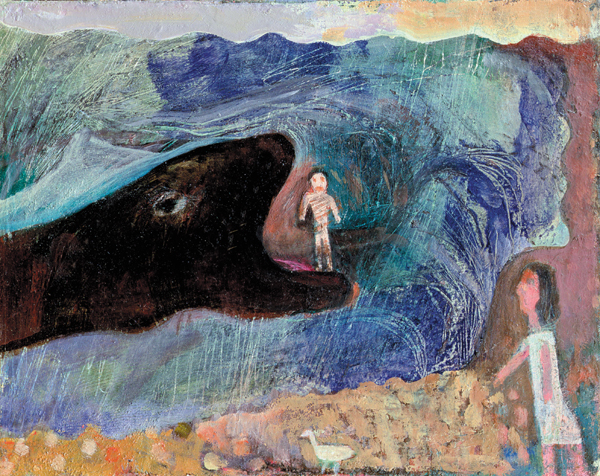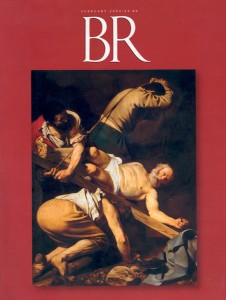
A woman and a bird witness the uncommon event of a man riding in the mouth of a whale in this painting, “Jonah and the Whale,” by the 20th-century British artist Albert Herbert. The prophet, standing naked on the beast’s pink tongue, wears a frown, but it is hard to tell if he is being swallowed or spat back up. Perhaps it doesn’t matter. Reading the story of Jonah, it is easy to imagine that the look on the prophet’s face was much the same coming out of the whale as it was going in: unhappy.
The story of Jonah, from start to finish, is one of reluctance. Having disobeyed the Lord’s command to go preach to the wicked city of Nineveh, Jonah takes flight by boat instead. When God’s wrath calls up a storm that threatens everyone on board, the prophet jumps overboard to save the ship and is swallowed by the whale—actually the Bible calls it “a great fish” (Jonah 1:17). In the creature’s belly Jonah prays and repents his disobedience; he is then spat up on the shore so he can go on to Nineveh and fulfill his mission. But even at the end of the story, after successfully redeeming the Ninevites and their animals, the prophet remains grumpy. He thinks God should have just destroyed the city. Angry, Jonah accuses God of being “gracious and compassionate” (Jonah 4:2–3). From anyone else, it would sound like a compliment.
Jonah leaves the city and sits down in the sun. God provides shade by growing a vine over him but then sends a worm to destroy it, again ruining Jonah’s mood. “You are concerned about the vine, for which you did not labor and which you did not grow,” God explains. “Should I not be concerned about Nineveh, that great city, in which there are more than a hundred and twenty thousand persons who do not know their right hand from their left?” (Jonah 4:9, 11).
Artist Albert, who was born in 1925, was academically trained in painting but turned in his middle age to a naïve style, trying to recapture the simple wonderment of childhood. He here depicts the moody Jonah with the simplicity of a child’s painting, and thereby makes this reluctant prophet seem appealingly human.

